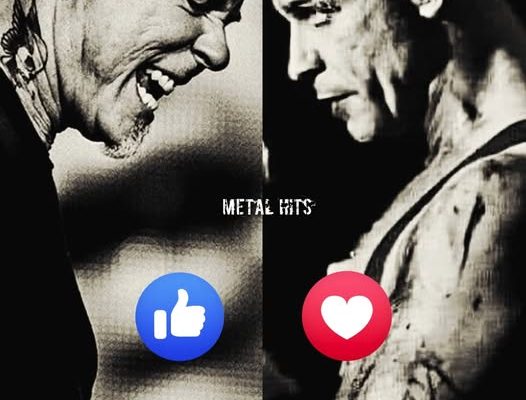When it comes to heavy metal, the title of “most iconic frontman” is a coveted crown, and two names often come up in the discussion: James Hetfield of Metallica and Till Lindemann of Rammstein. Both are titans of the genre, each having shaped the trajectory of metal in their own distinct ways. Hetfield is widely recognized as one of the founding members of Metallica, a band that is undeniably one of the biggest and most influential acts in rock and metal history. Meanwhile, Lindemann has become the unmistakable face of Rammstein, a band that has pioneered a blend of industrial metal, theatricality, and cultural controversy. Their legacy, presence, and impact on music are immeasurable, but who reigns supreme as metal’s most iconic frontman?
James Hetfield’s journey into metal stardom began in the early 1980s, when he co-founded Metallica with drummer Lars Ulrich. From the start, Hetfield’s growling voice and raw, aggressive guitar playing stood as a defining feature of the band. Metallica’s success isn’t just owed to Hetfield’s musical talent but also to his songwriting. His lyrics have tackled everything from personal demons to broader societal issues, earning him a reputation for creating deeply resonant and relatable material. Albums like Master of Puppets, Ride the Lightning, and Metallica (the “Black Album”) are considered milestones not only within the band’s discography but in metal as a whole.
Hetfield’s stage presence has also been a vital component of Metallica’s longevity. While Ulrich might have been the driving business mind, Hetfield was the vocal (and often physical) leader on stage, owning the arena with his larger-than-life charisma. With his distinctive vocal delivery, which blends a raw power with an almost conversational style, Hetfield became the voice of a generation of metalheads. His lyrics and performances resonated with fans who saw in him a reflection of their own struggles with identity, anger, and societal pressure. Songs like “One,” “Fade to Black,” and “Enter Sandman” are anthems that have transcended the genre and earned a place in mainstream culture.
On the other hand, Till Lindemann of Rammstein commands an entirely different kind of presence. Formed in 1994, Rammstein’s musical style combines industrial, heavy metal, and electronic elements, but it’s Lindemann’s theatricality that has become synonymous with the band. While his vocal style is unmistakably heavy, his deep, booming voice is different from Hetfield’s. It’s often compared to a dark, ominous force that carries the intensity of the music and complements Rammstein’s grandiose performances. Lindemann’s voice is an integral part of the band’s dark and satirical commentary on politics, culture, and human nature. Like Hetfield, his lyrics are deeply personal at times, but they are often more provocative, mixing dark humor, poetic absurdity, and biting social commentary.
The theatrical aspects of Rammstein’s live shows elevate Lindemann’s status even further. His performances are not simply concerts; they are full-blown spectacles. From pyrotechnics to elaborate stage designs to Lindemann himself often engaging in shock-value theatrics—such as his infamous “firebreathing” act—his performances are a far cry from the typical rock or metal show. This larger-than-life stage presence has led many to view Lindemann as the quintessential performer in the heavy metal and industrial music scenes. Rammstein’s live shows often border on the absurd, as Lindemann engages with his audience in ways that go beyond the music itself, creating a sort of ritualistic experience.
However, Lindemann’s legacy is not solely built on theatrics. His ability to create songs that strike at the core of human nature and society has earned Rammstein a level of critical acclaim that is often reserved for the most intellectually engaging of bands. Tracks like “Du Hast,” “Sonne,” and “Mein Land” have become cultural landmarks in their own right, sparking conversation both musically and philosophically. Rammstein’s willingness to address taboo subjects, sometimes with humor, sometimes with shocking directness, has given the band a reputation for being both controversial and thought-provoking.
While Hetfield’s lyrics have often leaned toward personal reflection and social commentary, Lindemann’s writing tends to be more surreal and darkly humorous. Hetfield’s themes of isolation, addiction, and war connect deeply with listeners, and his delivery is straightforward and relatable. In contrast, Lindemann’s lyrics, while equally emotional, tend to delve into darker, more uncomfortable territories, sometimes exploring violence, obsession, and dystopian visions of the future. Both lyricists, however, share a raw, unflinching approach to their craft, which helps foster a sense of catharsis for their respective audiences.
But beyond music, the key question that sets the two frontmen apart is their cultural influence. Metallica, under Hetfield’s leadership, helped bring metal from the underground to the mainstream. Metallica is a band that transcends genres, with Hetfield at the helm as the face of the group. Metallica’s early success helped establish thrash metal as a dominant force, and they played an integral role in the rise of arena rock. Their appeal isn’t limited to metalheads alone, as Metallica’s reach extends to a broader rock audience, making Hetfield a global icon.
Rammstein’s global appeal is similarly strong, but its reach has often been more niche, particularly in comparison to Metallica’s. That being said, Lindemann and Rammstein have a loyal and passionate fanbase, particularly in Europe and other parts of the world where they have cultivated an image of provocative, boundary-pushing artists. The band’s willingness to engage in political and social discourse, often with dark humor, has earned them a reputation as one of the most intelligent and fearless bands in the heavy metal and industrial scenes.
Both Hetfield and Lindemann have weathered the storm of personal battles. Hetfield, for example, has openly discussed his struggles with addiction, mental health, and the pressures of fame. His willingness to be vulnerable with his audience has only solidified his status as a figure of strength in the eyes of his fans. He’s become an emblem of resilience and determination, showing that even the most iconic figures are still human, with flaws and struggles. Similarly, Lindemann has faced his own controversies, particularly due to the provocative content of Rammstein’s music and stage performances, but he has never shied away from his provocative nature. He’s consistently pushed the boundaries of what is socially acceptable, and in doing so, he has helped redefine the relationship between artist and audience.
When it comes to the question of who reigns supreme, it’s important to note that both Hetfield and Lindemann are pioneers in their respective styles. Hetfield is the definitive frontman for one of the most successful metal bands in history, and his influence on both the sound and culture of heavy metal is undeniable. His work with Metallica, both musically and lyrically, has left an indelible mark on the genre. Lindemann, meanwhile, is an artist whose work with Rammstein has pushed boundaries in ways few other metal bands have dared to. His dark humor, provocative lyrics, and over-the-top performances have reshaped the expectations of what a metal show can be.
But, in the end, the comparison between Hetfield and Lindemann isn’t just about musical ability or stage presence—it’s about the impact they’ve had on their audiences. Metallica’s massive global success and Hetfield’s role as the face of the band make him a global symbol of metal, one who has influenced countless artists and fans. On the other hand, Lindemann’s ability to create a unique blend of music, theater, and cultural critique through Rammstein has earned him a reputation as one of the most captivating and fearless figures in metal.
Ultimately, the question of who reigns supreme depends on how one defines “iconic.” If you measure it by global influence, mainstream success, and the ability to shape the course of metal history, then James Hetfield likely holds the edge. However, if you define it by boundary-pushing, avant-garde performance, and the creation of a unique artistic identity that challenges societal norms, then Till Lindemann could be seen as the more iconic frontman in terms of sheer creativity and innovation.
Both men have made indelible contributions to heavy metal, and each, in his own way, has defined what it means to be a frontman in the world of metal. Their legacies, forged in the fires of metal history, will endure for decades to come. So, while one might not be definitively “better” than the other, there is no doubt that both Hetfield and Lindemann are among the most iconic figures the genre has ever known.



